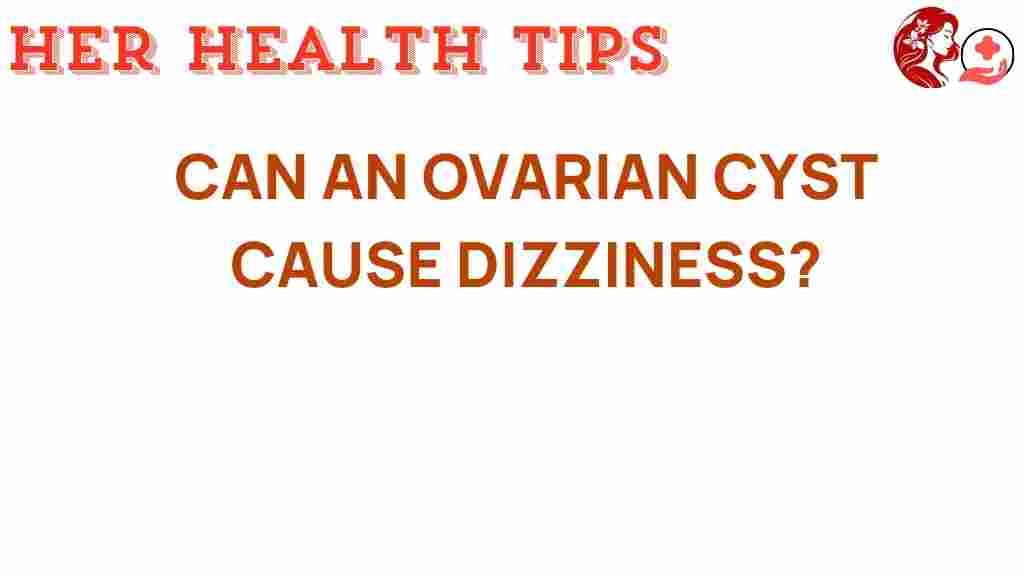Ovarian Cysts and Dizziness: Understanding the Connection
Women’s health encompasses a myriad of conditions, and one area that often raises questions is the relationship between ovarian cysts and dizziness. Ovarian cysts are fluid-filled sacs that develop on the ovaries and are quite common among women of reproductive age. While many women experience no symptoms from these cysts, others may face discomfort and a range of symptoms, including dizziness. In this article, we will delve into the connection between ovarian cysts and dizziness, exploring symptoms, diagnosis, treatment options, and essential medical advice for maintaining women’s wellness.
What Are Ovarian Cysts?
Ovarian cysts are typically benign growths that occur on the ovaries. They can form during the menstrual cycle and are often classified into two main types:
- Functional Cysts: These include follicular cysts, which develop when the ovary fails to release an egg, and corpus luteum cysts, which form after the egg is released.
- Pathological Cysts: These include dermoid cysts, endometriomas, and cystadenomas, which may require further evaluation and treatment.
While most ovarian cysts are harmless and resolve on their own, some can lead to complications, including abdominal pain and, in rare cases, dizziness.
Understanding Dizziness
Dizziness is a term that encompasses various sensations, such as feeling faint, lightheaded, or unsteady. It can be caused by numerous factors, including:
- Dehydration
- Low blood sugar
- Inner ear problems
- Medication side effects
- Hormonal changes
In women with ovarian cysts, dizziness may occur due to hormonal fluctuations or other related symptoms that can disrupt the body’s balance.
Symptoms of Ovarian Cysts
Many women with ovarian cysts experience no noticeable symptoms. However, when symptoms do arise, they may include:
- Abdominal pain or discomfort
- Irregular menstrual cycles
- Bloating or swelling in the abdomen
- Pain during intercourse
- Dizziness or lightheadedness
- Nausea or vomiting
Dizziness, in particular, is an important symptom to monitor, as it can indicate changes in the body’s hormonal balance or other complications related to ovarian cysts.
How Ovarian Cysts Can Cause Dizziness
The connection between ovarian cysts and dizziness can be attributed to several factors:
- Hormonal Changes: Ovarian cysts can lead to fluctuations in hormone levels, which may cause symptoms like dizziness.
- Abdominal Pain: Severe abdominal pain from a ruptured cyst may cause a stress response in the body, leading to feelings of dizziness.
- Pressure on Nearby Structures: Large cysts may press on surrounding organs, potentially affecting blood flow and causing dizziness.
Diagnosis of Ovarian Cysts
If you experience persistent abdominal pain or dizziness, it is crucial to seek medical advice. The diagnosis of ovarian cysts typically involves:
- Medical History Review: A healthcare provider will review your symptoms and medical history.
- Physical Examination: A pelvic exam may be conducted to check for any abnormalities.
- Imaging Tests: Ultrasounds are commonly used to visualize the ovaries and determine the presence and size of cysts.
- Blood Tests: Hormonal levels may be checked to assess any imbalances.
Early diagnosis is essential for effective treatment and management of symptoms, including dizziness.
Treatment Options for Ovarian Cysts
The treatment for ovarian cysts varies based on the type of cyst, size, and symptoms. Common treatment options include:
- Watchful Waiting: Many functional cysts resolve on their own without treatment.
- Medication: Hormonal contraceptives may help prevent the formation of new cysts.
- Surgery: In cases of large or persistent cysts, surgical removal may be necessary.
It’s important to discuss with your healthcare provider the best course of action for your situation, especially if you experience dizziness alongside other symptoms.
Managing Dizziness Related to Ovarian Cysts
If you find yourself experiencing dizziness due to ovarian cysts, here are some troubleshooting tips:
- Stay Hydrated: Dehydration can exacerbate dizziness, so ensure you drink enough fluids.
- Eat Regularly: Maintain stable blood sugar levels by eating balanced meals and snacks throughout the day.
- Rest: Allow your body to recover when you feel dizzy; lying down can help alleviate symptoms.
- Monitor Symptoms: Keep track of your symptoms and report any changes to your healthcare provider.
Additionally, consider integrating wellness practices into your routine, such as yoga and meditation, which may help manage stress and improve overall health.
When to Seek Medical Advice
It’s crucial to seek medical advice if you experience any of the following:
- Severe abdominal pain that does not go away
- Persistent dizziness or lightheadedness
- Signs of infection, such as fever or unusual discharge
- Difficulty breathing or chest pain
Prompt medical attention can help prevent complications and ensure proper management of ovarian cysts and associated symptoms.
Conclusion
The connection between ovarian cysts and dizziness can be complex, influenced by hormonal changes and physical symptoms. While many women experience ovarian cysts without significant complications, it’s essential to monitor any symptoms, including dizziness, and consult a healthcare provider for a proper diagnosis and treatment plan. By prioritizing women’s wellness and seeking medical advice when needed, you can navigate the challenges posed by ovarian cysts effectively.
For more information on ovarian cysts and women’s health, you may find this resource helpful.
Stay informed and proactive about your health, and remember that you are not alone in your journey. Connecting with support groups and healthcare professionals can provide additional guidance and reassurance.
This article is in the category Conditions and created by HerHealthTips Team
